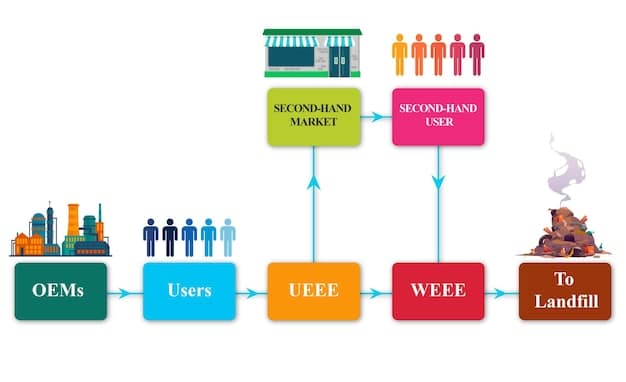New Federal Guidelines for Public Event Permits in 2025: What You Need to Know

The new federal guidelines for public event permits in 2025 focus on enhancing safety measures, streamlining the application process through digital platforms, and ensuring accessibility and inclusivity for all attendees, impacting event organizers nationwide.
Planning a public event in the US requires navigating a complex web of regulations, and 2025 brings new federal guidelines for public event permits that organizers need to understand. These updates aim to enhance safety, streamline processes, and promote inclusivity. Let’s delve into what you need to know about the new federal guidelines for public event permits in 2025 and how they will impact event planning.
Understanding the Scope of Federal Guidelines
Before diving into the specifics, it’s essential to understand the scope of these federal guidelines. They primarily affect events held on federal lands or those that receive federal funding. This could include national parks, military bases, or events sponsored by federal agencies. State and local regulations may also apply, so it’s crucial to consult with the relevant authorities in your area.
What Types of Events Are Affected?
The guidelines cover a wide range of public events, from large-scale festivals and concerts to smaller gatherings like protests and demonstrations. Any event that involves a significant number of people and potentially impacts public safety or resources falls under scrutiny.
These revisions are also influenced by recent incidents and aim to better equip local authorities and event organizers to handle unforeseen circumstances. The goal is to ensure that all events are conducted safely and responsibly, protecting both attendees and the surrounding community.
- Large-Scale Festivals: Events with multiple stages, vendors, and thousands of attendees.
- Concerts and Performances: Any live music or theatrical performance held in public spaces.
- Protests and Demonstrations: Gatherings organized to express political opinions or raise awareness about social issues.
- Sporting Events: Races, tournaments, and other athletic competitions held on federal lands or with federal support.
Ultimately, the federal guidelines act as a benchmark, encouraging responsible event planning and execution across the country.

Enhanced Safety Measures
A key focus of the 2025 guidelines is enhancing safety measures. This includes stricter requirements for security personnel, emergency response plans, and crowd control strategies. Event organizers will need to demonstrate a comprehensive approach to risk management and be prepared to address potential threats.
Emergency Response Planning
Event organizers must develop detailed emergency response plans that outline procedures for handling various scenarios, such as medical emergencies, natural disasters, and security incidents. These plans should be regularly updated and communicated to all staff and volunteers.
Furthermore, emergency response plans must now incorporate specific protocols for handling biohazards and other health-related emergencies. This is a direct response to recent global health events and underscores the importance of preparedness.
- Detailed Evacuation Plans: Clearly marked exits and procedures for safely evacuating attendees.
- Medical Support: On-site medical personnel and equipment to handle injuries and illnesses.
- Communication Systems: Reliable communication channels for coordinating emergency response efforts.
- Security Protocols: Measures to prevent and respond to security threats, including active shooter scenarios.
By implementing these enhanced safety measures, event organizers can create a safer environment for all attendees and minimize the risk of incidents.
Streamlined Application Process through Digital Platforms
Recognizing the need for efficiency, the 2025 guidelines also aim to streamline the application process through the use of digital platforms. This includes online application portals, electronic document submission, and virtual meetings with permitting officials. The goal is to reduce paperwork, speed up processing times, and improve transparency.
Benefits of Digital Application Systems
Digital application systems offer several advantages over traditional paper-based processes. They are more convenient, accessible, and environmentally friendly. They also allow for easier tracking and management of applications, reducing the risk of errors and delays.
The integration of AI-powered chatbots on these platforms is also anticipated to provide instant answers to common queries, further enhancing the user experience.
- Online Application Portals: Centralized platforms for submitting permit applications and supporting documents.
- Electronic Document Submission: Eliminates the need for paper copies and reduces administrative burden.
- Virtual Meetings: Allows for remote consultations with permitting officials, saving time and travel costs.
- Real-Time Application Tracking: Provides applicants with updates on the status of their application.
By embracing digital technology, the federal government hopes to make the permitting process more efficient and user-friendly for event organizers.

Ensuring Accessibility and Inclusivity
Another important aspect of the 2025 guidelines is ensuring accessibility and inclusivity for all attendees. This includes providing accommodations for people with disabilities, promoting diversity and inclusion in event programming, and addressing potential barriers to participation.
ADA Compliance and Beyond
Event organizers must comply with the Americans with Disabilities Act (ADA) and provide reasonable accommodations for people with disabilities. This may include accessible entrances, seating, restrooms, and assistive listening devices. However, the guidelines go beyond ADA compliance to encourage more inclusive practices.
These additions also champion the incorporation of universal design principles in event planning, ensuring that events are accessible and enjoyable for people of all abilities.
- Accessibility Audits: Conducting thorough audits of event venues to identify and address accessibility issues.
- Inclusive Programming: Featuring diverse performers, speakers, and vendors that reflect the community.
- Language Access: Providing interpretation and translation services for non-English speakers.
- Sensory Considerations: Creating quiet zones or sensory-friendly activities for people with sensory sensitivities.
By prioritizing accessibility and inclusivity, event organizers can create welcoming and engaging experiences for all members of the public.
Cybersecurity Protocols
In an increasingly digital world, cybersecurity has become a critical concern for event organizers. The 2025 federal guidelines include new protocols to protect event data and infrastructure from cyber threats. This includes implementing robust security measures, conducting regular risk assessments, and training staff on cybersecurity best practices.
Protecting Event Data
Event organizers collect a significant amount of personal data from attendees, including names, addresses, and payment information. It’s essential to protect this data from unauthorized access and misuse.
The new revisions stress the importance of adhering to international standards for data privacy, giving attendees greater control over their personal information.
- Data Encryption: Encrypting sensitive data both in transit and at rest.
- Access Controls: Limiting access to data based on job roles and responsibilities.
- Incident Response Plans: Developing plans for responding to data breaches and other cybersecurity incidents.
- Regular Security Audits: Conducting regular audits to identify and address vulnerabilities.
By prioritizing cybersecurity, event organizers can safeguard event data and maintain the trust of attendees.
Sustainability and Environmental Impact
The 2025 guidelines also emphasize sustainability and environmental responsibility. Event organizers are encouraged to minimize their environmental impact by reducing waste, conserving resources, and promoting sustainable practices. This includes using renewable energy, sourcing local and sustainable products, and implementing waste reduction programs.
Green Event Initiatives
There are many ways to make events more sustainable. Event organizers can partner with local environmental organizations, implement composting and recycling programs, and encourage attendees to use public transportation or bike to the event.
These expansions also encourage carbon offsetting initiatives, allowing event organizers to balance out their carbon footprint through investments in environmental projects.
- Waste Reduction Programs: Implementing composting and recycling programs to minimize waste.
- Sustainable Sourcing: Prioritizing local and sustainable products and vendors.
- Energy Efficiency: Using renewable energy and energy-efficient equipment.
- Water Conservation: Implementing water conservation measures, such as low-flow fixtures and drought-tolerant landscaping.
By embracing sustainability, event organizers can reduce their environmental impact and contribute to a healthier planet.
Community Engagement and Feedback
The final area of focus in the 2025 guidelines is community engagement and feedback. Event organizers are encouraged to engage with the local community, solicit feedback, and address concerns. This includes holding public meetings, conducting surveys, and establishing communication channels for addressing complaints and suggestions.
Building Strong Relationships with the Community
Engaging with the community is essential for building trust and support for events. Event organizers should work closely with local residents, businesses, and community organizations to ensure that events are well-received and benefit the community.
These engagements are also encouraged to incorporate new digital channels for gathering feedback, such as social media polls and online forums, ensuring a wider reach and more diverse input.
- Public Meetings: Holding public meetings to provide information about events and solicit feedback.
- Surveys and Questionnaires: Conducting surveys to gather feedback from attendees and community members.
- Community Advisory Boards: Establishing boards to provide ongoing input and guidance.
- Communication Channels: Establishing communication channels for addressing complaints and suggestions.
By prioritizing community engagement and feedback, event organizers can create events that are both successful and beneficial to the community.
| Key Point | Brief Description |
|---|---|
| 🛡️ Enhanced Safety | Stricter security, emergency plans, and crowd control. |
| 💻 Digital Applications | Online portals streamline the permit process. |
| ♿️ Accessibility | Ensuring inclusivity for all attendees including ADA compliance. |
| 🌎 Sustainability | Reducing waste and promoting eco-friendly practices. |
Frequently Asked Questions
▼
The guidelines apply to public events held on federal lands or those which receive federal funding, covering a range of gatherings like festivals, concerts, and demonstrations. This ensures safety across diverse event types.
▼
The guidelines enhance safety by requiring stricter security personnel, detailed emergency response plans, and strategic crowd control measures, ensuring a safer environment for attendees.
▼
The streamlined process includes online application portals for easy submission, electronic document handling to reduce paperwork, and virtual meetings to save time, making it more efficient.
▼
Accessibility and inclusivity are addressed through ADA compliance, inclusive programming, language access, and sensory considerations, making events welcoming for all attendees.
▼
Sustainability involves waste reduction, sustainable sourcing, energy efficiency, and water conservation measures, which minimize the environmental impact of events. Embracing these helps promote a healthier planet.
Conclusion
Staying informed about the new federal guidelines for public event permits in 2025 is crucial for event organizers across the US. By understanding and implementing these guidelines, organizers can ensure the safety, accessibility, and sustainability of their events, while also streamlining the permitting process. Keeping these points in mind will contribute to successful and responsible event planning in the years to come.





